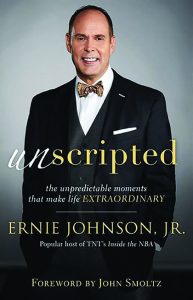TUESDAY, FEBRUARY 27, 2018
Ernie Johnson is TNT’s anchor voice for the PGA Championship, but his life is far broader than that, including growing up with an Atlanta sports legend, a fight with lymphoma, adopting four international children, including one with special needs, and his recent book. Here we offer Johnson’s extended answers to two questions we asked him for our full article in the Links Player Magazine. You’ll find that article here.
In broadcasting, there are stat guys and there are story guys. Vin Scully is probably the ultimate story guy. Where would you say you fall in that? Are you more a stats-interested guys or a story guy?
“I’m more of a story guy. I do a lot of stats and that kind of thing, and I think you have to have that in your saddle bag going in, especially these days in baseball and that kind of thing where the value of stats has changed and there are so many different kinds of stats and you can pick and choose which ones that you feel comfortable dealing with. But to me it’s always been the stories.
“To me it’s been, What makes an athlete vulnerable? What makes you want to root for this guy? What makes it a compelling story when you’re doing a baseball game? I think there being a storyteller plays more into it with the time the game takes, the time between pitches, where you want to fill in the blanks and let somebody who’s watching a game say, ‘I never knew that about that guy. What a cool story!’ It’s much like when you’re watching a movie. The character development of the characters in a film, that makes you want this guy to get out of this tough situation, or makes him want to get the girl at the end. Those are the things that if they’re just nameless faces out there playing, and you’re just saying, ‘He hit a ground ball, or he went two for three’—if you can add something to that, I think that’s where fans enjoy hearing that kind of a thing.
“I have files on hundreds of baseball players that we’re going to see during the year and you can maybe when you’re looking at a media guide know what’s happened with a player this year or eight years ago he suffered an injury. But to go deeper than that, if you’re at the game the day before and you see this player, you say, ‘Tell me about this situation when…’”
Did your love for stories make it easier for you when you sat down to write your story?
“In a way. Number one, you have to have that in you if you’re going to write the book. You can’t just say, “OK, let’s write a book. I don’t really want to tell any stories, but I want to write a book.” The two just don’t go together. So there has to be that desire to do that.
Then there has to be the time to do it. I did a lot of late night writing, when everybody was in bed and I was just in my office at my house. I found myself going into depth about stories I hadn’t thought about in a long time. In a way it was cathartic, in a way it was emotional. But that’s in your wheelhouse if you are at heart a storyteller and want to share that. It was a really cool process.
“I didn’t know what to expect in terms of how it went, and when you had something written, what do you do with it? How do you know if it’s what the publisher wants or that kind of thing? Then the give-and-take between my literary agent and my publisher at Baker Books. You’d send them a chapter and say, ‘Tell me what you think.’ So you’re electronically doing this. You’re emailing them and they’re sending it back with notes in the margin: “We need to know more about how you felt when this actually happened. What were your emotions when that part happened?” And then you’re kind of going deeper. It was a very cool process and ultimately one of the most rewarding things I’ve ever done.”
